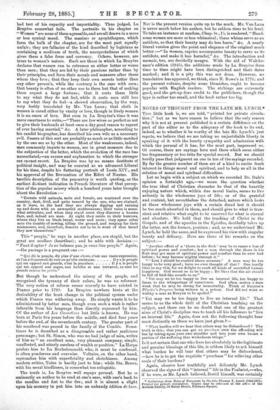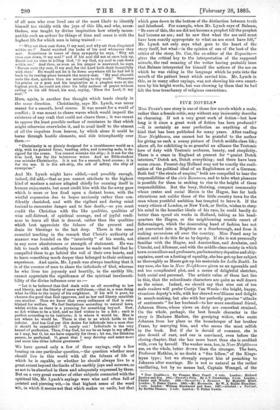NOTES OF THOUGHT FROM THE LATE MR. LYNCH.* Tilts little
book is, we are told, "printed for private circulation ;" but as we have reason to believe that the only reason why it is not at present published is a certain diffidence on the part of the editor as to the adequacy of the book to its end, indeed, as to whether it be worthy of the late Mr. Lynch's just repute, we believe that we are taking no unjustifiable liberty in speaking of it with the hearty sympathy and admiration with which the perusal of it has, for the most part, impressed us. Of course, there are sayings here and there which seem either too fragmentary or too trite for special record. But we should hardly pass that judgment on one in ten of the sayings recorded.
By far the greater number of them are of a kind to excite fresh interest in things moral and spiritual, and to help us all in the solution of moral and spiritual difficulties.
Let us begin with a subject on which we recorded Dr. Dale's opinion a fortnight ago,—we mean the question whether the true ideal of Christian character be that of the heartily enjoying nature which, within due moral limits, seems to live ardently in the wholesome joys of life; or of the grateful and content, but nevertheless the detached, nature which looks at these wholesome joys with a certain dread lest it should be too much absorbed in them, and should give to what is transient and relative what ought to be reserved for what is eternal and absolute. We hold that the teaching of Christ in the Gospels, and of the apostles in the Epistles, decidedly takes up the latter, not the former, position ; and, as we understand Mr. Lynch, he held the same, and lie expressed his view with singular beauty and delicacy. Here are three of his remarks on the subject :—
"Another effect of a thorn in the flesh' may be to cause a loss of spiritual power and comfort; but a man through the thorn in his flesh may get more of spiritual power and comfort than he over had before ; he may become mighty through it."
"'Lest I should be exalted above measure.' A man may be too happy to be very good ; have we ever thought of that ? One hardly likes to say this, for we delight to exalt all kinds of sanctified human happiness. God meant us to be happy ; Ho likes that the air should be full of bird-like sounds to us."
"Yet may we be too happy to live an internal life, too -happy to listen to the whisperings of conscience. God often makes a man weak that he may be strong for immortality. Think of Banyan's Pilgrim's Progress being written in a prison. God did not want so worthy a man as Bunyan to be spoiled.
"Yet may we be too happy to live an internal life." That seems to us the whole drift of the Christian teaching on the subject, and there can be no doubt that one of the greatest aims of Christ's discipline was to teach all his followers to "live an internal life." Again, does not the following thought bear most distinctly on those we have just given ?—
" What burden will we boar that others may be disburdened ? The truth is this ; that yon can get no purchase over tbe offending will but by taking upon your own shoulder and into your own breast a portion of the suffering that wickedness brings."
Is it not certain that one who lives too absolutely in the legitimate and genuine blessings of this life, is seldom likely to ask himself
what burden be will bear that others may be disburdened, —how he is to get the requisite " purchase " for relieving other souls of their burdens?
Again, observe bow truthfully and delicately Mr. Lynch observed the signs of this " internal " life in the Psalmist,—who, if he were, as Mr. Lynch believed, David himself, was certainly of all men who ever lived one of the most likely to identify himself too vividly with the joys of this life, and who, nevertheless, was taught by -divine inspiration how utterly incom patible such an ardour for things of time and sense is with the highest life for which man is being trained :—
" Why art thou cast down, 0 my soul, and why art thou disquieted within me?' David watched the looks of his soul whenever they met. Sometimes in tones of deep sympathy he says, Why art thou cast down, 0 my soul ?' and if his soul did not at once look up, David lost no time in telling God, 0 my God, my soul is cast down within me.' And then, as soon as his prayer is answered, he says, 'Return unto thy rest, 0 my soul, for the Lord hath dealt bountifully with thee.' Be would not let it lie down anywhere till he had led it back to its resting-place beneath the mercy-seat. My soul cleaveth unto the dust, quicken thou me according to thy word.' Whenever his genius as a poet and his inspiration as a prophet were at the highest pitch, he could not close his lofty anthem of praise without calling on his old friend, his soul, saying, 'Bless the Lord, 0 my
Here, again, is another fine thought which tends clearly in the same direction. Christianity, says Mr. Lynch, was never meant for a smooth, level coarse. It was meant for a world of conflict ; it was meant to cleave waves which would imperil the existence of any craCt that could not cleave them ; it was meant to oppose the least possible surface of resistance to that which might otherwise overwhelm it, and to avail itself to the utmost of all the impulses from heaven, by which alone it could be borne through hostile elements, and ride triumphantly over them :—
" Christianity is as plainly designed for a troublesome world as a ship, with its pointed front, bending sides, and towering sails, is designed for the ocean. You cannot mistake the ship; it is not for the firm land, but for the boisterous water. And no Bible-student can mistake Christianity. It is not for a smooth, level course; it is for the sea. It is the ark-ship, the ark of safety, the ship of enterprise."
And Mr. Lynch might have added,—and possibly enough, indeed, did add,—that as you cannot attribute to the highest kind of mariner a nature adapted chiefly for sunning itself in human enjoyments, but must credit him with the far-away gaze which is more or less fixed upon a distant home, with the wistful expression due to hopes anxiously rather than confidently cherished, and with the vigilant and daring mind trained to encounter danger and to face death,—so you must credit the Christian with the like qualities, qualities of wise self-distrust, of. spiritual courage, and of joyful readiness to leave all that is dearest, rather than the qualities which best appreciate the fulness of the present and drain its blessings to the last drop. There is the same essential teaching in the remark that Christ's authority of manner was founded on the " interiority " of his words, not in any mere absoluteness or strength of statement. He was felt to teach with authority because he made men feel that be compelled them to go behind the veil of their own hearts, and to learn something much deeper than belonged to their ordinary experience. And again, Mr. Lynch was always teaching that it is of the essence of man to share the infinitude of God, whereas he who lives too joyously and heartily, in the earthly life, cannot appreciate the significance of the spiritual inexhaustibility of the divine influence over us :—
" Let it be believed that God deals with us all according to law and liberty, not the liberty of mere wilfulness,—Oat is, a man doing what he likes to the injury of his neighbour. If his will is pure, he chooses the good that God approves, and so law and liberty establish one another. Then we know that every ordinance of God is established for welfare. We feel limitations according to natural laws, whilst within us there is a yearning for something beyond. Now, no fish wishes to be a bird, and no bird wishes to be a fish ; each is perfect according to its instincts; it is where it would be. Man is not where he would be. There is that in us which holds to the infinite. And has God put this desire for infinitude into a man that it should be unsatisfied 0, surely not Infinitude is the very kernel of perfection. Then, 0 my God, let ins be as large in my affairs as I may, but 0, let me have capacity for them ; let me, the thinking. person, be perfected. 0, grant that I may develop and enter more and more into thine infinite greatness."
We have quoted only a few of these sayings, only a few bearing on one particular question,—the question whether man should live in this world with all the fulness of life of which he is capable, or whether he should always live to a great extent beyond the limits of his earthly joys and sorrows, so as not to be absorbed in them and adequately expressed by them.
But on a very great number of other subjects connected with the spiritual life, Mr. Lynch's sayings were wise and often fall of pointed and piercing wit,—in that highest sense of the word wit, in which it means not that which makes us smile, but that
which goes down to the bottom of the distinction between truth and falsehood. For example, when Mr. Lynch says of Balaam, "Be sure of this, the ass did not become a prophet till the prophet had become an ass ; and he saw that what the ass said mast have been exactly appropriate to what an ass must have felt," Mr. Lynch notonly says what goes to the heart of the story itself, but what—in the opinion of one of the best of the critics of the story, Dr. Cox, the ex-editor of the Expositor— gives the critical key to the interpretation of the supposed miracle, the real meaning of the writer having probably been that Balaam interpreted for himself the actions of the ass on which he was riding in the language which he puts into the month of the patient beast which carried him. Mr. Lynch in this, as in many other sayings, was not showing his own smartness by his bright words, but was showing by them that he had felt the tree trenchancy of religious convictions.



































 Previous page
Previous page